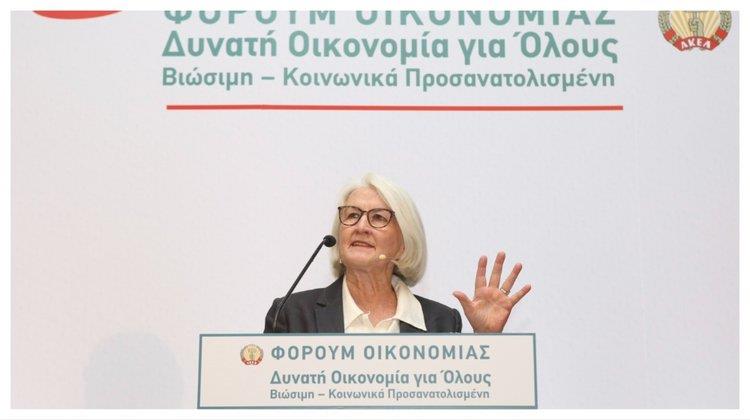Cyprus needs to focus on an economic model that is not solely dependent on exports, thus protecting the rights and living standards of domestic workers, Ann Pettifor, Director of Policy Research in Macroeconomics (PRIME) has suggested.
Addressing her audience, she called on Cyprus to act as a model state that invests in regulatory procedures and transparency mechanisms, contributing to a more balanced economy, where financial development serves the common good and not just the interests of the few.
Ann Pettifor was speaking at AKEL’s 3rd Economic Forum entitled ‘A Strong Economy for All: Sustainable - Socially Oriented.’
Based on the question ‘Who really wins in the global financial game?,’ the speaker referred to current analyses linking international trade, inequality and the multi-layered challenges facing local economies.
She focused on the need to readjust Cyprus' economic strategies to address the uneven benefits of trade, while exploring the mechanisms of the global financial market that often maintain or increase inequality.
The impact of exports on inequality and the working class
Analysing a study by Pettis and Klein (2018), the speaker explained how the prevalence of exports as a development strategy by economies such as the EU and China has led to increasing internal inequality.
Exports, she pointed out, boost the profits of big companies, while the lower income classes and local workers see their economic power stagnate or decline.
Her reference to Germany, which became a classic example after the Hartz reforms, highlighted the problem of wage inequalities and differences in income distribution.
In this context, Cyprus must focus on an economic model that is not solely dependent on exports, thus protecting the rights and living standards of local workers.
The "shadow banking system" and the lack of trust in financial markets
Continuing, the speaker presented the dangers of the shadow banking system and the ever-increasing role of non-bank intermediaries in the financial field. Referring to her own research, Pettifor pointed out that the continued increase in loans from these entities – which operate outside of traditional banks – creates a system without the necessary transparency and credibility.
According to the speaker, money and currency markets, often characterised by irresponsibility and lack of regulation, contradict the basic principles of trust and cooperation necessary for a healthy economy.
The presentation arrived at the critical topic of asset management and financial "guarantees". Investments, as she pointed out, are no longer evaluated solely on the basis of their actual returns but also on the expectation of future income, creating an unstable system that can be disastrous.
Finally, Pettifor called on Cyprus to act as a model state that invests in regulatory procedures and transparency mechanisms, contributing to a more balanced economy, where financial development serves the common good and not just the interests of the few.
(Source: InBusinessNews)









